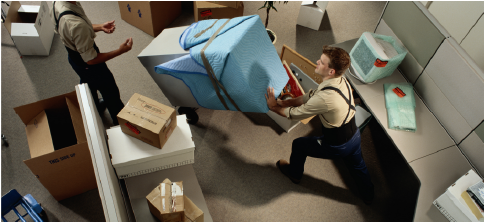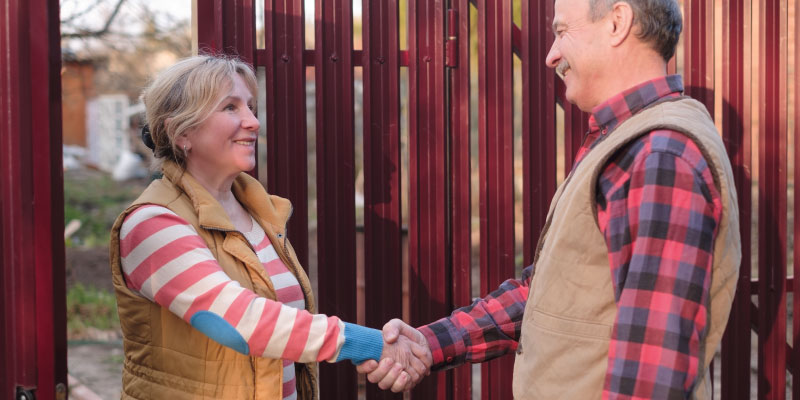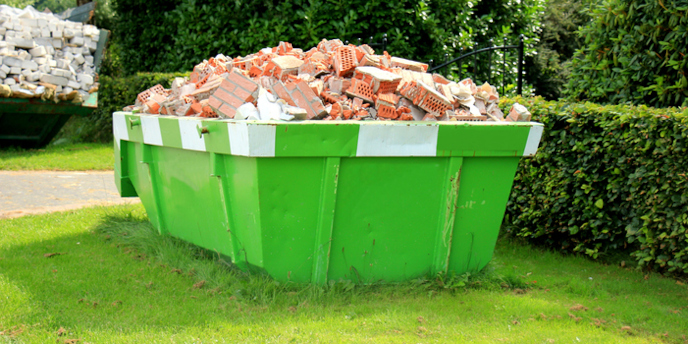
Updated November 4, 2025
Renting a dumpster is one of the most affordable and convenient ways to handle waste from home cleanouts, remodeling projects, or demolition jobs. Whether you’re doing spring cleaning or tearing down a structure, dumpster rentals make debris removal simple and cost-effective.
Dumpster rental prices are generally straightforward, but there are a few hidden costs to watch for. The quoted rate you receive typically includes delivery, pickup, disposal, a set rental period, and a specific weight limit. However, exceeding those limits or keeping the dumpster longer than expected can lead to extra charges.
On average, a 10 yard dumpster rental costs between $250 and $450 in the U.S., though prices vary depending on your location, the size of the dumpster, and the type of debris you’re disposing of. Larger containers and heavy materials like concrete or roofing shingles generally increase the total cost.
Each dumpster provider sets their own terms for rental periods, weight allowances, and overage fees, so it’s important to review your rental agreement carefully. Following the outlined guidelines can help you avoid unexpected charges and ensure you get the best deal on your dumpster rental.
In this guide, we’ll break down the most common dumpster overage fees and share simple tips to help you stay within budget.
Jump to:
- Going Over Your Included Weight
- Avoiding Adding Prohibited Items
- Renting a Dumpster That’s Too Small
- Choosing Based on Price Alone
Get same-day dumpster pricing
Request availability and pricing from dumpster
rental companies near you.
Going Over Your Included Weight
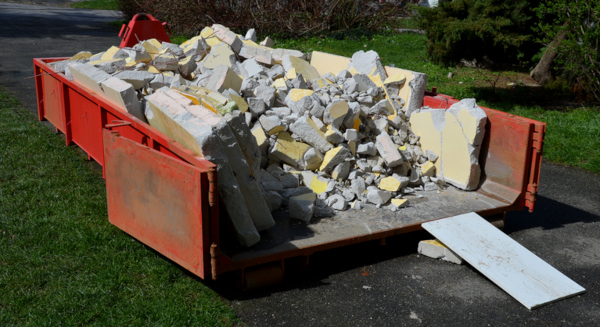
Understanding Dumpster Overage Fees and Weight Limits
Most dumpster rental companies charge additional fees if you exceed the dumpster’s stated weight allowance. These extra charges are known as overage fees, and they can quickly add up if you’re disposing of heavy materials.
Overage fees typically range from $50 to $100 per ton, depending on your location and the rental company’s pricing policy. It’s important to know that these fees usually aren’t prorated—meaning that even if you go just a few pounds over your limit, you may still be charged for the full additional ton.
For example:
- A 10 yard dumpster may include a 4,000 lb (2 tons) weight limit.
- The base rental price might be $300, with an overage fee of $50 per ton.
- If your dumpster load weighs 4,050 lbs, you could owe the full $50 overage charge.
- If it weighs 6,010 lbs, your total overage cost would be $100 in this example.
How Heavy Debris Affects Dumpster Weight
When disposing of heavy materials, the total weight can climb faster than you might expect. For instance, one cubic yard of concrete can weigh up to 4,000 lbs, meaning just a few yards could push your dumpster well beyond its limit.
Common types of heavy debris that can cause overage charges include:
- Concrete and asphalt
- Dirt and soil
- Roofing shingles
- Bricks and other masonry materials
Tips to Avoid Overage Charges
To prevent surprise fees, always confirm your dumpster’s weight allowance before loading it. If your project involves heavy debris, ask your dumpster rental provider for guidance. They can recommend the right size and weight capacity for your materials.
Keeping weight limits in mind from the start will help you stay within budget and avoid unexpected costs when your dumpster is picked up and weighed.
Avoid Adding Prohibited Dumpsters
Adding prohibited items to your dumpster is one of the most common reasons customers face unexpected dumpster rental fees. Every dumpster rental company has its own list of items that are restricted or banned due to safety and environmental regulations.
Typical items not allowed in a dumpster include:
- Liquids (such as oil, fuel, or solvents)
- Flammable materials
- Paints and stains
- Tires
- Appliances containing refrigerants (like air conditioners or refrigerators with Freon)
Some dumpster rental providers may accept these materials for an additional disposal fee, while others strictly prohibit them. Always confirm what’s allowed before loading your dumpster to avoid penalties.
Why Prohibited Items Matter
Trying to hide hazardous or restricted materials in a dumpster isn’t worth the risk. Not only can it be dangerous for the environment and waste handlers, but the issue will likely be discovered when your dumpster is emptied at the landfill or transfer station.
If that happens, you could be billed for extra handling or disposal fees, sometimes even after the dumpster has been hauled away. These costs can vary widely depending on the material type and your local regulations.
How to Avoid Penalties
To stay compliant and avoid surprise charges:
- Review your rental agreement for a full list of prohibited dumpster items.
- Ask your dumpster provider during booking about any questionable materials.
- Dispose of hazardous waste through your local household hazardous waste program or recycling facility instead.
Taking a few minutes to confirm what’s allowed can save you from paying unnecessary fines and extra fees later.
Keep reading: What Goes in a Dumpster and What Doesn't [Infographic]
Compare dumpster rates and save today
Request availability and pricing from dumpster
rental companies near you.
Renting Too Small of a Dumpster
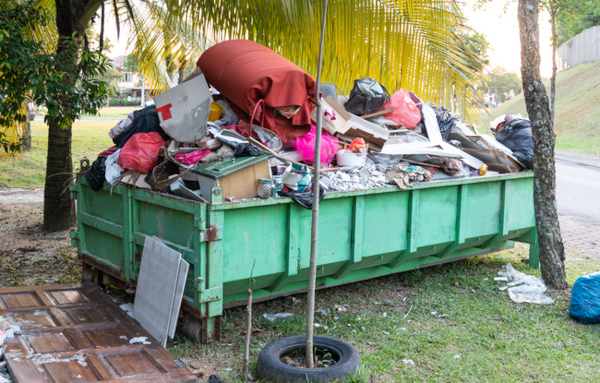
One of the most common, and expensive, mistakes homeowners make is renting a dumpster that’s too small for the job. While it might seem like choosing a smaller dumpster will save money upfront, it can actually cost you hundreds more if you end up needing a second container.
When a dumpster fills up before your project is complete, you’ll either need to:
- Order a second dumpster (doubling your total cost), or
- Schedule an additional pickup and delivery, which adds more fees.
Why a Slightly Larger Dumpster Is Worth It
The easiest way to avoid this issue is simple: size up. If you think a 10-yard dumpster might work, consider upgrading to a 15 yard dumpster instead.
Here’s a quick cost comparison:
- 10 yard dumpster: around $300
- 15 yard dumpster: around $350
That $50 difference is minimal compared to paying $600 or more for two smaller dumpsters if you underestimate your debris volume. The same logic applies to larger sizes. Choosing a 20 yard dumpster instead of a 15 yard dumpster often costs just $50-$100 more, but saves time, hassle, and money in the long run.
How to Choose the Right Dumpster Size
When you’re unsure which dumpster size fits your project, always err on the side of caution and choose the larger option. Your dumpster rental company can help estimate the best size based on:
- The type of materials you’re disposing of
- The size and scope of your project
- Local disposal regulations and weight limits
A slightly larger dumpster provides the flexibility you need without the stress of running out of space mid-project.
Learn more:
- Why Large Dumpsters Sometimes Cost Less Than Small Dumpsters
- What's the Smallest Dumpster You Can Rent?
Renting a Dumpster Based on Price Alone

While it’s tempting to go with the lowest dumpster rental quote, choosing solely based on price can end up costing you in the long run. When comparing local waste haulers, price should be only one factor in deciding which company to hire.
Factors to Consider When Choosing a Dumpster Rental Company
To ensure a smooth rental experience, consider these key factors:
- Reputation of the company – Are they known for reliable service and timely pickups?
- Licensing and insurance – A licensed and insured company protects you from liability.
- Schedule flexibility – Can they deliver and pick up the dumpster when you need it?
- Dumpster size availability – Do they offer the right size for your project?
Additionally, read verified customer reviews online and ask friends or family for recommendations. This will help you avoid unknown or unreliable companies that may provide subpar service despite offering a lower price.
How to Use Reviews and Resources to Find a Reputable Dumpster Rental
Hometown publishes verified customer reviews to help you choose trustworthy dumpster rental companies in your area. Using this resource, you can:
- Browse dumpster rental providers by zip code
- Read customer feedback for each company
- Request multiple quotes to ensure you’re getting a fair price
By evaluating companies based on reputation, reliability, and customer feedback, you’ll save yourself time, stress, and potentially costly mistakes, even if it means paying slightly more upfront.
Find the best dumpster rental prices near you
Request availability and pricing from dumpster
rental companies near you.
Keep reading:
